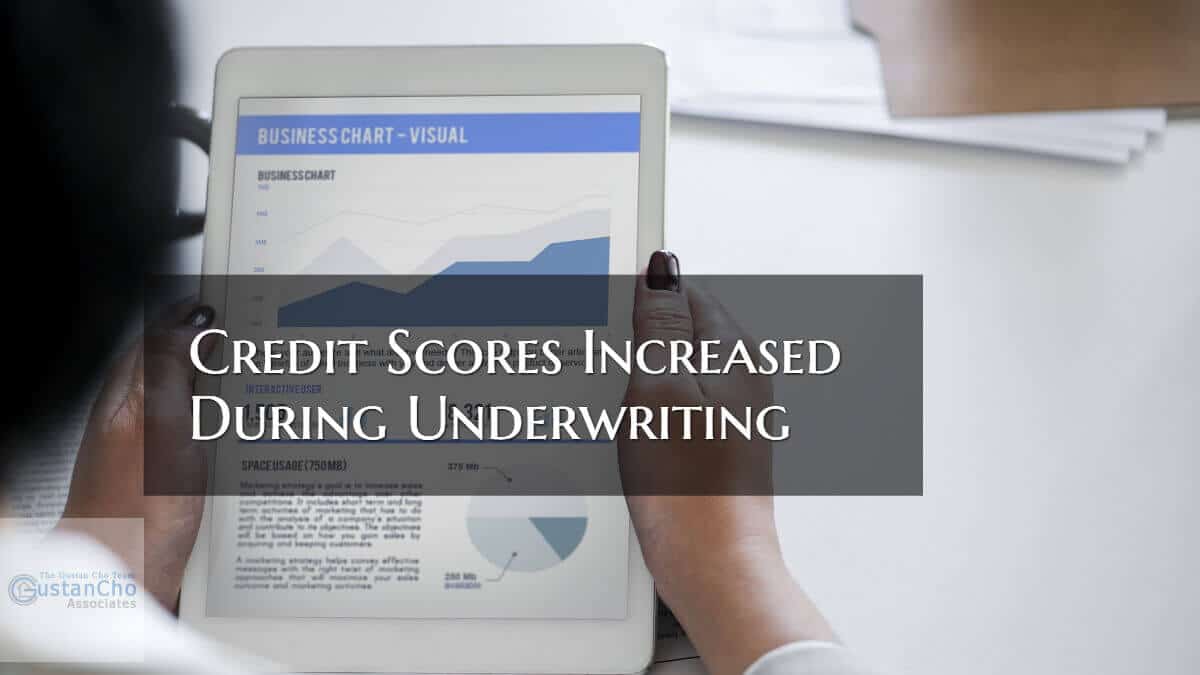Credit Scores Increased During Underwriting Process
In this article, we will cover credit scores increased during underwriting process. If credit scores increased during underwriting process, the borrowers could lock the loan with the higher credit score. One of the frequently asked questions at Gustan Cho Associates is will I get a lower rate if credit scores increased during underwriting process? Credit scores determine whether borrowers qualify for a particular mortgage loan program. For example, HUD, the parent of FHA, requires a minimum credit score of 580 FICO credit scores for borrowers to qualify for FHA loans with a 3.5% down payment on a home purchase. Alex of Gustan Cho Associates said the following on the minimum credit score requirements to qualify for an FHA loan:
The minimum credit score requirement on FHA loans is 500 FICO. If Borrower has a under 580 FICO credit scores, then HUD will require buyers to put down a 10% down payment.Therefore, any borrower with credit scores down to 500 FICO, they would need a 10% down payment.
Fannie Mae and Freddie Mac require borrowers to have at least a 620 credit score to qualify for Conventional loans. Most FHA 203k Lenders will require that FHA 203k mortgage borrowers have 640 credit scores to qualify for FHA 203k loans. VA loan does not have any credit score nor debt-to-income ratio requirements. However, a 580 FICO credit score is recommended for Borrowers to get an approve/eligible per AUS. USDA Loans will require 640 credit scores. In this article, we will discuss and cover credit scores increased during underwriting Process And Benefits.
Credit Scores Mortgage Guidelines For Loan Programs
Credit scores will also have an impact on debt-to-income ratio requirements. For example, HUD will limit debt-to-income ratio requirements to 43% DTI for borrowers with credit scores of under 620 to get an automated underwriting system.
HUD allows debt-to-income ratios of up to 56.9% DTI for Borrowers with credit scores of 620 Credit Scores or higher to get AUS Approval. Credit scores will also play a major factor in Conventional mortgage interest rates.
With Conventional loans, the higher the borrower’s credit scores are, the lower their mortgage interest rates are because Conventional loans are not insured and guaranteed by the government like government loans. FHA, VA, and USDA loans are insured by the government and are often referred to as government loans. Many borrowers often ask what happens if credit scores increased during underwriting process.
Can I Use New Credit Scores If Credit Scores Increased During Underwriting Process
There are many times when credit scores increased during underwriting process for many borrowers. If your credit scores increased during the underwriting process, the original credit scores used with the submission of the mortgage loan application could be replaced with higher ones.
If the credit scores drop during the mortgage underwriting process, borrowers are safe for 120 days. Many lenders have overlays where the initial credit scores can only be used throughout the whole mortgage process, even though credit scores increased during underwriting process.
Often, borrowers with credit scores of under 620 FICO get a non-occupant co-borrower. This is because the debt-to-income ratio maximum limit is 43% DTI to get an approve/eligible per AUS. But if credit scores increased during underwriting process, the borrower may no longer need the non-occupant co-borrower. This holds true because their credit scores have increased over 620 FICO. With borrowers with credit scores of 620 or higher, the maximum debt-to-income ratio caps at 46.9% front end and 56.9% DTI back end for AUS Approval.
Hurdles With The Mortgage Process With Lenders With Overlays
In situations like these, the following occurs with lenders with overlays: The original loan submission must be completely canceled. A new mortgage loan application needs to be signed by the borrower. New mortgage disclosures need to be disclosed without the non-occupant co-borrower.
Case scenarios above are with lenders with no overlays where they are adamant borrowers need to use original credit scores.
Gustan Cho Associates is a national mortgage company licensed in multiple states with no lender overlays. We allow using of new higher credit scores during the mortgage process.
What If Credit Scores Increase During Underwriting Process on Conventional Loans
Mortgage rates greatly impact credit scores and loan-to-value on conventional loans. To get the best mortgage interest rates on conventional loans, Borrowers will need a 740 FICO credit score. For any credit scores below 740, there will be a pricing adjustment to borrowers.
Conventional loans are not insured like FHA loans. HUD insures FHA loans originated and funded by lenders
With Conventional loans, any borrower with less than a 20% down payment will require private mortgage insurance. Private mortgage insurance premiums will also depend on the borrower’s credit scores and loan to value. The higher the borrower’s credit scores, the lower the private mortgage insurance premium will be. Higher credit score borrowers are considered less risky for lenders and private mortgage insurance companies.
Mortgage Process When Credit Scores Increased
If scores increased during underwriting process significantly, then the following is the best way to use new credit scores due to lender overlays. One way would be to cancel the original loan and reapply so you can reapply with the new increased credit score.
Some lenders would not cancel the original loan and get you a better rate with your high credit score. Have the mortgage loan officer resubmit a new mortgage loan application.
Have the loan officer resend out new mortgage disclosures with new credit scores. This strategy may cause delays in closing a home loan. However, the savings on getting a lower mortgage interest rate may be worth the delay in mortgage loan closing.
What If Credit Scores Decreased During Underwriting Process
There are instances where a borrower’s credit scores have decreased during the mortgage process, and many borrowers get extremely concerned: This holds true, especially for borrowers who barely met the minimum lending guidelines on credit scores.
The great news is that mortgage lenders will only go by the credit scores that the mortgage loan application was processed and submitted, and that credit score will be valid for 120 days. To qualify for a 3.5% down payment FHA loan, the minimum credit score required is 580 credit score.
If the borrower has a 580 credit score and their mortgage loan application gets approve/eligible per DU FINDINGS, the borrower should have no problem in closing on their home loan.
How Long Is Original Credit Scores Valid During Mortgage Process
Suppose a borrower’s credit scores drop during the mortgage underwriting process. In that case, that should not matter: This holds true because the credit score of 580 FICO will be used throughout the mortgage approval process. The issue will arise if the mortgage process takes more than 120 days.
The original credit score used to qualify the borrower is valid for 120 days. Once the 120 days expires, a new credit report will be pulled by the lender. and the prior credit scores is no longer valid.
If that is the case, the lender must pull a new credit report. The new credit scores from the new credit report will be used. This often may become an issue with borrowers who purchase a new construction home. There are construction delays, and the closing of their new construction home can take longer than 120 days.







